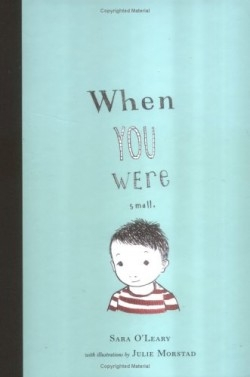When You Were Small
There is nothing children like better than to hear stories about when they were very young. They love to hear about the silly things they did and said before they were old enough to remember. Henry is no exception.
Every night he and his father meet in a pair of wingback chairs and begin the conversation the same way: “Dad,” says Henry, “tell me about when I was small.” His father entertains his son with whimsical tales, imagining that Henry was once so small he could take his pet ant out for a walk on a leash, or ride in his father’s shirt pocket.
The author is an award-winning playwright, fiction writer, and literary columnist, but it’s her experience as the mother of two boys that helps her know exactly what will capture the imagination of her young audience. Henry’s father invents endearing descriptions like: “When you were small we used to give you baths in the teapot, and when you were done we could just tip it over and pour you out,” or “When you were small you couldn’t hold a spoon so you used to sit on the edge of my porridge bowl and dip your head in like a baby bird.” The pair imagine that, thanks to Henry’s Lilliputian size, he has the good fortune to wear a thimble for a hat, stand in for a lost chess piece, and ride a ruler instead of a toboggan.
O’Leary’s text is accompanied by pale watercolors and detailed cross-hatch drawings of a tiny Henry snuggled into his father’s slipper, or nude and poised to jump into the teapot for his bath. This is the illustrator’s first children’s book, and her art incorporates details beyond the written words. For example, when Henry is lost in the bottom of his mother’s purse and is finally found clinging to an earring, the reader not only sees Henry hanging by one arm from the hoop earring pinched between an unknown adult’s fingers, but the tiny child is wearing striped pajamas and is clutching an empty candy wrapper, a faint and wistful smile on his face.
Children as young as three will enjoy the tales of Henry’s adventures, in which being miniscule means that the most mundane tasks like brushing teeth or eating porridge become veritable feats.
The last lines of this book may also spark conversations between adult and child: a question is cleverly answered with a question. “Dad,” says Henry, “is all that true?” His dad replies, “Well, don’t you remember?” Henry is left scratching his head, as might the young readers (or listeners) who will continue to ponder being so small that they can ride on the back of a cat like an emperor.
Reviewed by
Cymbre Foster
Disclosure: This article is not an endorsement, but a review. The publisher of this book provided free copies of the book to have their book reviewed by a professional reviewer. No fee was paid by the publisher for this review. Foreword Reviews only recommends books that we love. Foreword Magazine, Inc. is disclosing this in accordance with the Federal Trade Commission’s 16 CFR, Part 255.

